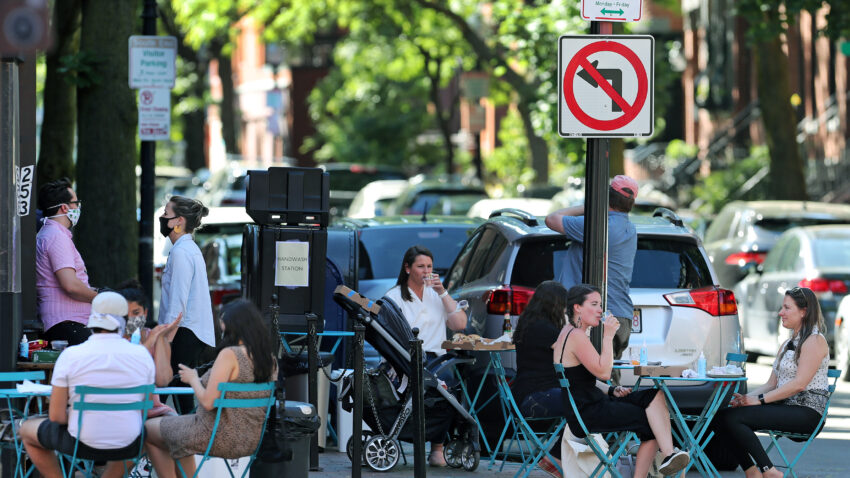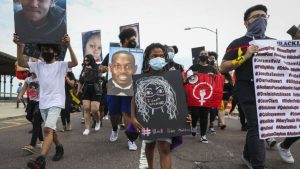A Maine facility that produces tests for Abbott Labs to detect the novel coronavirus has become the site of a viral outbreak.
Tesla employees in California revealed that several of their colleagues tested positive for the coronavirus following chief executive Elon Musk’s reopening of the company’s main production facility last month in defiance of government public health orders.
Members of the D.C. National Guard who were deployed last week in response to the protests over George Floyd’s killing have tested positive, but a spokeswoman refuses to reveal how many troops have the virus. Two members of the Nebraska National Guard who were activated last week in Lincoln, Neb., also tested positive. Public health experts are watching anxiously to see if the wave of nationwide protests leads to a spike of infections, especially among the African American community that has already been disproportionately affected.
Hospitalizations for coronavirus cases have been on the rise in at least nine states since Memorial Day: Texas, North and South Carolina, California, Oregon, Arkansas, Mississippi, Utah and Arizona. More than a dozen states, plus Puerto Rico, are recording their highest averages of new cases since the pandemic began. And the total number of new cases also continues to increase worldwide. Experts say this is not just because testing has become more widespread.
As states continue to push ahead with reopening, these are flashing red lights that we are not out of the woods, the danger of a second wave remains high and bringing folks back to work — while necessary for economic recovery — is fraught. Americans may be moving on, but the virus is not.
Anthony Fauci, who has been the federal government’s top infectious-disease expert since 1984, told biotech executives on Tuesday that the coronavirus is “my worst nightmare” because it’s brand new, highly transmissible, attacks the respiratory system and kills. “We’ve had outbreaks that have had one or two or three of those … but never all four,” he said during a live stream. “Ebola was scary, but Ebola would never be easily transmitted … HIV, as important as it is, was drawn out and over an extended period of time.”
Fauci, the director of the National Institute of Allergy and Infectious Diseases, said the coronavirus will not just “burn itself out with mere public health measures,” but a vaccine will be required. “In a period of four months, it has devastated the whole world,” he said. “And it isn’t over yet.”
More than 110,000 people have died in the United States of the virus, and about 2 million cases have been confirmed. Beyond the numbers, the human toll from this remains staggering. Our newspaper has fresh obituaries on a longtime New York internist who had a dogged work ethic and gregarious personality, an MRI technician who died at the Miami hospital where he had worked more than 30 years, a Queens rabbi who volunteered in an ambulance corps and a Japanese immigrant who worked for 27 years at the University of Maryland’s library.
States continue to ease restrictions. On Friday, northern Virginia and Richmond will join the rest of the commonwealth in the next phase of reopening. Plans are underway to get students back to school in the fall.
“We have to stay smart because reopening resets the whole game,” Gov. Andrew Cuomo, D-N.Y., said at his daily briefing on Tuesday, pointing to a spike of cases in states like Florida as they reopened. “When you reopen, when people start coming out, in some ways, you go right back to day one.”
President Donald Trump plans to begin attending in-person rallies again in the next few weeks, and Republicans have tentatively settled on moving the bulk of their August convention from Charlotte, N.C., to Jacksonville, Fla., to ensure that they can have large-scale events amid the pandemic, Annie Linskey and Josh Dawsey reported. North Carolina health officials declined to promise that they would allow the Republican National Committee to fill an arena in Charlotte for the Aug. 24-27 convention.
“I don’t want to be sitting in a place that’s 50% empty,” Trump told North Carolina Gov. Roy Cooper, D, in a recent phone conversation about the convention. “We can’t do social distancing.”
Meanwhile, top officials from the White House’s own coronavirus task force told governors during a conference call that they’re worried about a spike in infections because of the protests. Someone leaked a recording of the Monday call to the Daily Beast: “Dr. Deborah Birx, Trump’s Coronavirus Response Coordinator, relayed fears that the yelling by protesters could potentially negate the health benefits of wearing a mask, and that the destruction of testing sites at those protests would set back efforts to contain the virus’s spread. Birx said that 70 such sites had been destroyed, which had already resulted in an appreciable dip in testing rates there. She advised governors to ‘scramble now to make sure there is testing available in urban areas.’ Vice President Mike Pence, who hosted the call, bluntly conceded that protest-related infection spikes were ‘an issue our team is following and there is a concern.’”
Battling the contagion has become a lower priority across the Trump administration. “It’s been more than a month since the White House halted its daily coronavirus task force briefings,” Politico reports. “Inside the White House, top advisers like Jared Kushner privately assured colleagues last month that the outbreak was well in hand — citing data on declines in community spread — and that the long-feared ‘second wave’ may have even been averted … The COVID-19 task force has scaled back its once-daily internal meetings — the task force now meets twice per week … The coronavirus task force, which used to send daily updates to state officials, has done so with less regularity over the last several weeks … At the Food and Drug Administration, officials are returning to hot-button issues like tobacco and CBD regulations. Some staff in the health department’s emergency response arm are pivoting away from COVID-19 and back toward natural disasters as hurricane season begins.”
The Trump administration has provided little guidance on how to expand testing, leaving states wrestling on their own with how to do so. “Faced with conflicting advice from experts in the field, states are using different tests that vary in reliability and have adopted a variety of policies about who else should get tested and when … That means that while tests are available to anyone who wants them in states such as Kentucky and Georgia and some large cities such as Detroit and Los Angeles, state officials in Idaho and Louisiana continue to recommend that only sick people get tested,” the Post reported.
“In Maryland, drive-through coronavirus testing sites are now open to all residents, whether or not they show signs of illness. In Oregon, by contrast, officials have said that generally only people with symptoms … should be tested — even in the case of front-line health-care workers. In Rhode Island, officials have proactively tested all of the state’s 7,500 nursing home residents, including those with no symptoms, and are developing plans to test more people in high-risk workplaces, such as restaurants and grocery stores … The lack of a unified national strategy has left Americans uncertain about whether and how to be tested and is hampering reopening plans, experts warn … So far, about 460,000 Americans are being tested a day — 1.5% of the population, and still shy of the 900,000 to 30 million that experts say need to be tested daily to capture the extent of the virus’s spread.”
Kelly Wroblewski, director of infectious diseases at the Association of Public Health Laboratories, said the federal government is not even providing the kind of routine guidance it normally gives in screening for flu and other outbreaks. “The states are on their own,” she said. “There has been no coordination.”
“The demand for gowns outpaces current U.S. manufacturing capabilities.” That’s a direct quote from an internal FEMA slide deck, which shows the supply of surgical gowns has not meaningfully increased since photos emerged in March of nurses wearing trash bags for protection. “After months of pressure on federal officials to use wartime powers to mobilize U.S. plants, the document’s slides show that domestic manufacturing of gowns and surgical masks has ticked up by a few thousand per month since the pandemic hit, falling far short of need. The United States still does not manufacture any nitrile rubber gloves,” Roll Call reported. “The slides show FEMA’s plan to ramp up supply into June and July hinges on the reusing of N95 masks and surgical gowns, increasing the risk of contamination. Those are supposed to be disposed of after one use.”
Get Boston.com’s e-mail alerts:
Sign up and receive coronavirus news and breaking updates, from our newsroom to your inbox.


















